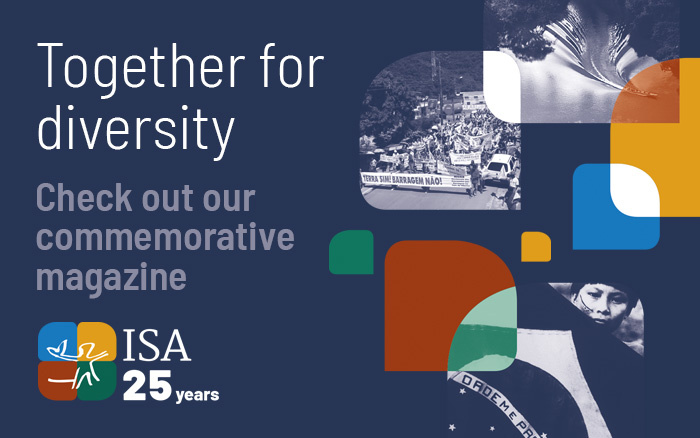Você está na versão anterior do website do ISA
Atenção
Essa é a versão antiga do site do ISA que ficou no ar até março de 2022. As informações institucionais aqui contidas podem estar desatualizadas. Acesse https://www.socioambiental.org para a versão atual.
ISA 25 years: a summary of our history
quarta-feira, 13 de Novembro de 2019 
Instituto Socioambiental (ISA) launches a publication to commemorate 25 years of work in the defense of Brazil's cultural and biological diversity and of search for a new country model
25 years ago, the Instituto Socioambiental(ISA) began the construction of its work
in defense of the rights of indigenous people, traditional communities and the environment. Since its founding, in 1994, Brazil and the rest of the world have changed — and so did ISA to keep up with the transformations in place.
It has adapted to the demands of an increasingly connected world, incorporating new
languages and creating platforms to disseminate its collection of images, maps and documents, expanding its communication capacity with various sectors of society.
To celebrate its 25th anniversary, ISA launches ISA magazine 25 years - Together For Diversity. The publication summarizes the organization's history by showing how it operates, restoring important achievements and registering efforts to promote and articulate local, regional, national and international initiatives.
Since its foundation, ISA has faced the challenge of seeking alternatives for the protection and territorial management of Indigenous Lands and traditional people — quilombolas, extractivists and riverside dwellers —, to strengthen the political participation of these communities and to value their culture and knowledge, besides helping to generate income through initiatives for the sustainable management of the natural resources of the territories.
Thus, it develops actions at local and regional level working in the Rio Negro (Amazonas and Roraima), Xingu (Mato Grosso and Pará) and Ribeira de Iguape (São Paulo) watersheds. The Rio Negro is one of the most preserved regions of the Brazilian Amazon, on the triple border of the country with Colombia and Venezuela. The Xingu, in turn, is one of the main regions pressured by the advancement of the farming frontier in the Amazon and where indigenous, riverside dwellers and extractivists have been resisting. And Ribeira de Iguape, where is the largest portion of the remaining Atlantic Forest of Brazil, and home to quilombola communities, as well as other traditional communities.
In common, these regions have a huge cultural and biological diversity and are considered as Brazilian heritage.
At a national level, ISA closely monitors legislative, executive, and judiciary proposals that may directly impact indigenous and traditional communities, and proposes alternatives to public policies in defense of these populations and the environment. It also monitors Indigenous Lands and Conservation Units throughout the country, following demarcation processes, the creation of protected areas and the threats that surround them, such as deforestation, infrastructure works, fires, mining, illegal mining and land grabbing, especially in Brazil's Legal Amazon, providing information and qualifying the public debate.
In times of serious setbacks and global instability, ISA reaffirms its longstand and unflagging commitment to the forest peoples, to their constitutional rights and to social and environmental sustainability.
This is ISA’s way of working.
This is our story.
Enjoy your reading.
ISA
Imagens:



